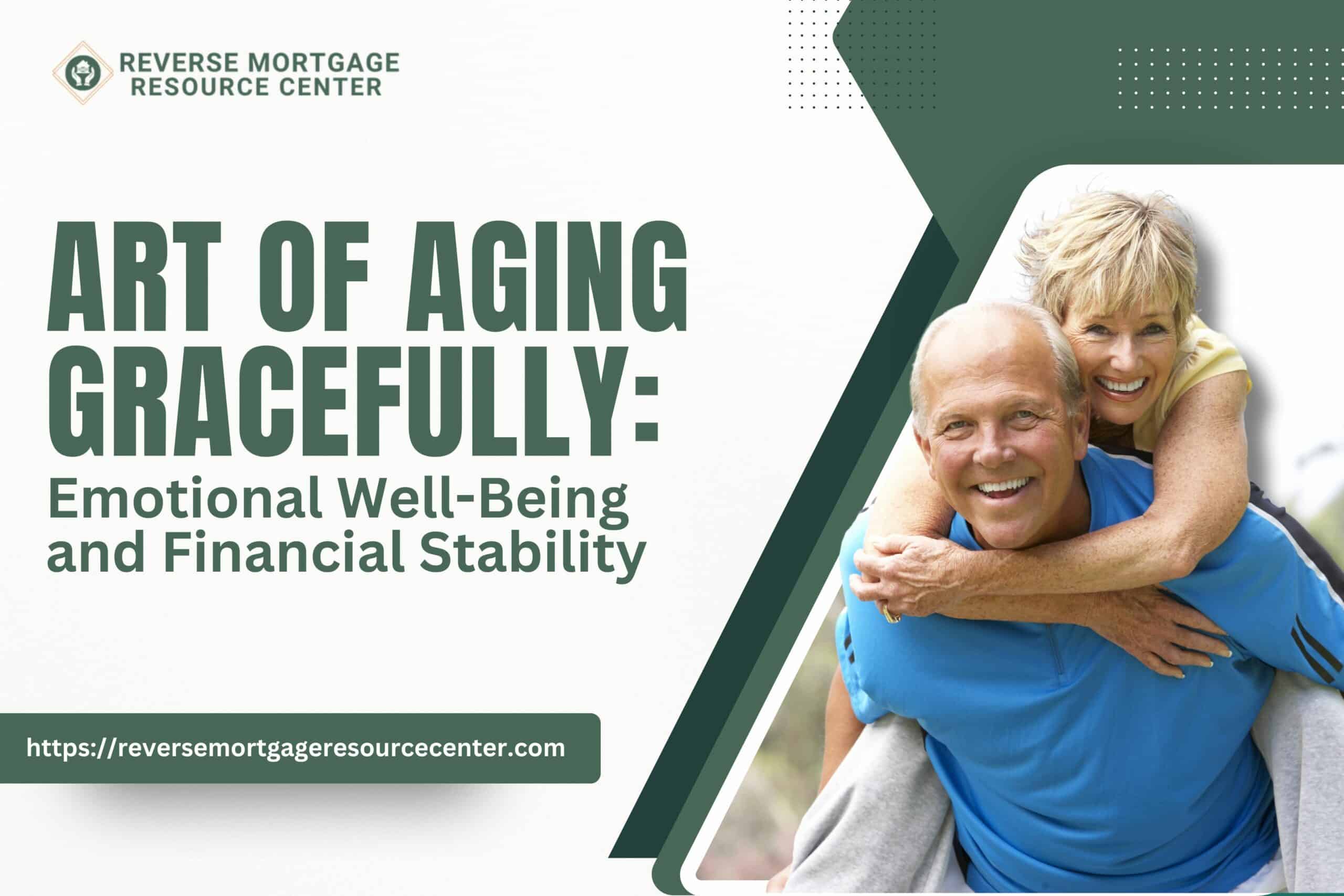Art of Aging Gracefully: Emotional Well-Being and Financial Stability
As seniors embark on the journey of retirement, the intersection of emotional well-being and financial stability becomes a crucial focal point in ensuring a fulfilling and harmonious life during this phase. The correlation between these two aspects is intricate, and understanding how to navigate this juncture with grace is an essential skill. This article aims to shed light on the connection between emotional well-being and financial stability, offering strategies for maintaining a positive mindset while making critical financial decisions, and advocating for the incorporation of mindfulness and self-care into retirement planning.
Recognizing the Connection: Emotional Well-Being and Financial Stability
Retirement is a significant life transition that often brings a myriad of emotions to the forefront. The sense of identity tied to a career, coupled with concerns about financial security, can create a unique set of challenges. Recognizing the connection between emotional well-being and financial stability is the first step in navigating this transition with grace.
Understanding the Emotional Landscape
As individuals retire, they may experience a range of emotions, including a sense of loss, anxiety about the future, or even excitement about newfound freedom. It is crucial to acknowledge and process these emotions, allowing oneself the time and space to adjust to the new reality. Seeking support from friends, family, or professional counselors can be instrumental in managing emotional well-being during this period.
Financial Stability as a Pillar of Emotional Wellness
Financial stability serves as a foundational pillar for emotional well-being in retirement. Concerns about outliving savings, unexpected medical expenses, or market fluctuations can contribute to stress and anxiety. Developing a comprehensive financial plan that addresses these concerns can provide a sense of security, allowing individuals to focus on enjoying their retirement years.
Strategies for Maintaining a Positive Mindset in Financial Decision-Making
Navigating financial decisions in retirement requires a proactive and positive mindset. Here are strategies to foster a constructive approach to financial planning:
Financial Education and Consultation
Seniors should invest time in enhancing their financial literacy. Understanding investment options, tax implications, and estate planning can empower individuals to make informed decisions. Seeking guidance from financial advisors who specialize in retirement planning can provide personalized insights tailored to individual needs and circumstances.
Focus on Controllable Factors
While some aspects of the financial landscape are beyond our control, it’s essential to focus on factors that can be managed. Establishing a budget, diversifying investments, and regularly reviewing financial plans are within an individual’s control and can contribute to a more secure financial future.
Embracing Flexibility
Retirement plans may need to evolve as circumstances change. Being open to reassessing financial strategies and adjusting them as needed allows for greater adaptability in the face of unexpected challenges or opportunities.
Incorporating Mindfulness and Self-Care into Retirement Planning
Mindfulness and self-care play a pivotal role in promoting emotional well-being and enhancing the overall retirement experience. Integrating these practices into retirement planning can lead to a more balanced and fulfilling life.
Mindfulness in Financial Decision-Making
Mindfulness involves being fully present in the moment and making decisions with awareness. Applying mindfulness to financial decisions can help individuals avoid impulsive choices driven by fear or anxiety. Taking the time to reflect on long-term goals and values can lead to more thoughtful and intentional financial planning.
Embracing Self-Care Practices
Retirement is an opportunity to prioritize self-care and well-being. Engaging in activities that bring joy, maintaining social connections, and adopting a healthy lifestyle contribute to a positive emotional state. Investing time in hobbies, volunteering, or pursuing lifelong learning can add depth and meaning to the retirement years.
Building a Supportive Community
Connecting with like-minded individuals who share similar interests or facing similar challenges can provide a strong support system. Whether through local community groups or online forums, sharing experiences and insights can create a sense of camaraderie and mutual support.
Investing in Emotional Well-Being: The Role of Purpose and Engagement
Beyond financial stability, finding purpose and engagement in retirement is vital for emotional well-being. Many retirees discover renewed passion and fulfillment by exploring activities that align with their interests and values.
Identifying Personal Passions
Retirement is an opportunity to rediscover or pursue passions that may have been set aside during a career. Whether it’s art, music, travel, or community service, dedicating time to activities that bring joy and a sense of purpose can significantly contribute to emotional well-being.
Continuing Education and Skill Development
Staying mentally active is crucial in retirement. Enrolling in classes, attending workshops, or pursuing certifications not only provides intellectual stimulation but also offers opportunities to connect with like-minded individuals. Lifelong learning fosters a sense of accomplishment and helps individuals stay engaged in the world around them.
Volunteerism and Community Involvement
Contributing to the community through volunteer work can be immensely rewarding. It not only provides a sense of purpose but also fosters social connections. Many retirees find fulfillment in giving back to causes they are passionate about, creating a positive impact on both themselves and their communities.
The Role of Social Connections in Emotional Well-Being
Social connections are a cornerstone of emotional well-being, especially in retirement. Maintaining and nurturing relationships can provide support, companionship, and a sense of belonging.
Cultivating Friendships
Retirement often brings changes in social dynamics, but it also offers an opportunity to build new friendships. Joining clubs, participating in group activities, or attending social events for seniors can facilitate the formation of meaningful connections.
Family Bonds and Intergenerational Relationships
Strengthening bonds with family members and fostering relationships with younger generations can bring immense joy. Grandparent-grandchild relationships, in particular, offer a unique opportunity for mutual learning and shared experiences.
Utilizing Technology for Social Engagement
In the digital age, technology provides numerous avenues for staying connected. Video calls, social media, and online communities enable retirees to maintain relationships with friends and family, regardless of geographical distances.
Financial Wellness through Mindful Spending and Planning
Maintaining financial stability in retirement involves not just accumulating savings but also adopting mindful spending habits and thoughtful financial planning.
Mindful Spending
Understanding the difference between needs and wants is crucial in retirement. Adopting a mindful approach to spending involves evaluating purchases in terms of their impact on long-term financial goals. Creating a budget that aligns with one’s lifestyle and priorities ensures that resources are allocated wisely.
Creating a Sustainable Income Stream
Diversifying income sources is essential for financial stability. Besides pensions and savings, exploring opportunities for part-time work, consulting, or leveraging skills and expertise can contribute to a steady income stream. This approach not only bolsters financial security but also provides a sense of purpose and engagement.
Estate Planning and Legacy Considerations
Addressing estate planning early on is a responsible step towards ensuring the financial well-being of loved ones. Working with legal professionals to create a comprehensive estate plan, including wills and trusts, can provide peace of mind and leave a lasting legacy.
Embracing Health and Wellness in Retirement
Physical health is intrinsically linked to emotional well-being. Adopting a proactive approach to health and wellness can enhance the overall retirement experience.
Prioritizing Regular Exercise
Maintaining an active lifestyle is crucial for physical and mental health. Whether it’s walking, swimming, yoga, or other forms of exercise, incorporating regular physical activity into daily routines contributes to overall well-being.
Healthy Nutrition and Lifestyle Choices
Adopting a balanced and nutritious diet supports long-term health and vitality. Making mindful choices about nutrition and lifestyle can have a positive impact on energy levels, mood, and overall well-being. Additionally, staying hydrated and getting sufficient rest contribute to the body’s resilience and ability to enjoy retirement actively.
Regular Health Check-ups and Preventive Care
Proactive health management involves scheduling regular check-ups and screenings to detect and address potential health issues early on. Staying informed about one’s health status empowers individuals to make informed decisions and take preventive measures, fostering a sense of control and well-being.
Mental Health and Cognitive Engagement
Cognitive well-being is equally vital in retirement. Engaging in activities that stimulate the mind, such as puzzles, games, or learning new skills, helps maintain cognitive function. Additionally, staying socially active and maintaining a positive outlook on life positively impact mental health.
Adapting to Financial Challenges: Resilience and Resourcefulness
Financial challenges can arise unexpectedly in retirement, and cultivating resilience and resourcefulness is essential for navigating these situations with grace.
Emergency Funds and Contingency Planning
Building an emergency fund is a prudent financial strategy at any stage in life, but it becomes especially crucial in retirement. Having a financial safety net for unexpected expenses, such as medical emergencies or home repairs, provides peace of mind and helps maintain financial stability.
Adapting to Market Changes
Financial markets are dynamic, and retirees may face challenges due to market fluctuations. Adopting a long-term perspective, diversifying investments, and periodically reassessing financial strategies can help mitigate the impact of market changes on retirement savings.
Exploring Part-Time Employment and Entrepreneurship
For those facing financial challenges in retirement, exploring part-time employment or starting a small business can be a viable option. This not only provides additional income but also allows individuals to stay engaged and maintain a sense of purpose.
Technology and Financial Management in Retirement
Leveraging technology can significantly enhance financial management in retirement, offering tools and resources to streamline processes and make informed decisions.
Online Banking and Financial Apps
Embracing online banking and financial apps provides convenient ways to manage accounts, track expenses, and monitor investments. These tools offer real-time insights into one’s financial situation, facilitating informed decision-making and budget management.
Digital Communication with Financial Advisors
Technology enables seamless communication with financial advisors, even from the comfort of one’s home. Regular virtual meetings with financial professionals allow for ongoing discussions about financial goals, market updates, and adjustments to retirement plans as needed.
Digital Security Measures
With the increasing prevalence of online financial management, prioritizing digital security is paramount. Implementing robust cybersecurity measures, using secure passwords, and staying vigilant against potential threats ensure the safety of financial information.
Legacy Planning and Philanthropy in Retirement
Considering the impact one leaves behind is an integral aspect of retirement planning. Legacy planning and philanthropy can add depth and meaning to the later years of life.
Charitable Giving and Community Involvement
Many retirees find fulfillment in giving back to the community through charitable activities. Whether volunteering time, contributing financially to causes, or actively participating in community projects, philanthropy can create a lasting positive impact.
Passing on Wisdom and Values
Legacy planning involves more than just financial considerations. It includes passing on wisdom, values, and life lessons to future generations. Creating a legacy that extends beyond monetary assets ensures a meaningful impact on family and society.
REVERSE MORTGAGE RESOURCE CENTER ~LIVE LIFE ON YOUR TERMS~
Our Lending Team has been serving our clients since 2004. We are passionate about serving our clients with integrity to help them achieve their financial goals.






